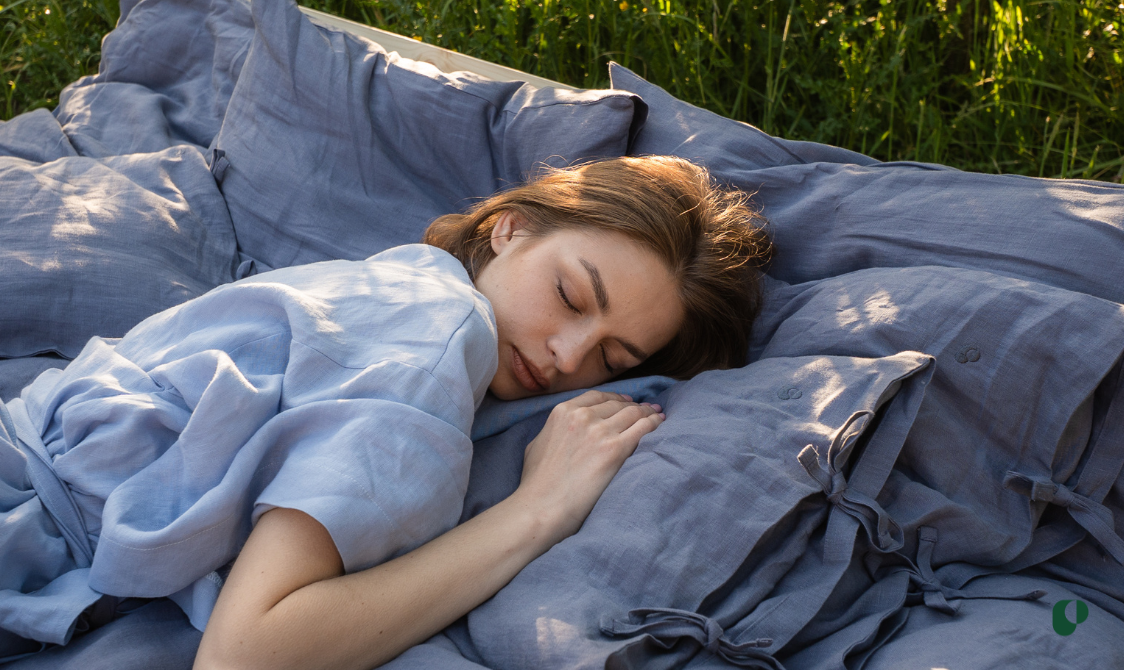What happens in our body while we sleep?

Have you ever wondered what happens in our body when we sleep? Is it resting, resetting, or maybe working at full capacity? In order to present you a dream from the inside out, we invited Dr. Joanna Podgórska to cooperate on this post, who explains the intricate processes in an easy language.
The post was prepared on the basis of a conversation you can find on our Youtube channel:
Why do we really sleep?
We sleep so that our bodies can function. All the processes taking place in us during the day - such as acting, thinking, speaking - are only possible when we get enough sleep. Looking a bit more biochemically: when we sleep, the organs and the entire neurochemical economy responsible for the functioning of the brain regenerate . Simply put - our brain "refreshes" after a whole day of work, cleansing it of deposits and toxins. This is especially important now, when we are struggling with overstimulation and an excess of information flowing from all sides. Sleep also allows for the regulation of digestion or the synthesis of neurotransmitters (e.g. dopamine or serotonin).

The human nervous system is divided into two parts:
- sympathetic , which activates us, stimulates us, where cortisol and adrenaline work, and where the “flight or fight” reaction takes place,
- parasympathetic - responsible for relaxation , rest, activated when we sleep. The “rest and digest” reaction takes place here, as well as cellular “recycling”. This is when all processes related to the biochemistry of the body take place.
During the day, we can observe increasing fatigue with the advancing time of the day. This is the result of the action of adenosine, the so-called Fatigue Barometer. When we function normally and our organs work - it begins to produce. The more there is, the more tired we feel. It is the high levels of adenosine and melatonin (sleep hormone) that are the key signals for us that the body needs sleep. The adenosine accumulated during the day is removed during sleep, so that the cycle starts again the next day.
Circadian rhythm
Circadian rhythm is a relatively new topic. In 2017, the Nobel Prize in Medicine and Physiology was awarded to researchers who discovered the "internal clock" in the human body. It turned out that not only does such a phenomenon exist, it also has a huge impact on our lives, regulating and optimizing the functioning of our body in a 24-25 hour rhythm.

Today, when we live in a fast pace, our day-night functioning is disturbed and defined by access to light , including artificial light. Scientists have noticed that this translates into our health and even life. Observing people working in shifts, with artificial light and disturbed sleep cycles, a relationship was discovered between abnormal secretion of melatonin and more often developing cancer. This was particularly resonant after research on women working shifts, carried out in Scandinavian countries. Disruption of melatonin levels has been found to exacerbate cancers of hormonal origin, such as breast cancer.
The topic of circadian rhythm is still being explored by scientists. Two of them decided to conduct a self-study, locking themselves in a cave in Kentucky. Its purpose was to check whether our body functions in any time frame without access to light . It turned out that it is about 24 hours (possibly a bit more), during which the body works rhythmically . It secretes digestive juices, the intestines work in a certain way, peristalsis and pancreatic enzymes are activated.
However, there was still a belief that it was dependent on the light entering our eyes or the melatonin produced in the pineal gland. It was only later discovered that the Zeitgebers - givers of time. We have a small internal clock in our body systems. It tells how a given structure is currently supposed to work, for example in the context of secreted digestive enzymes.
Chronobiology is also interested in this topic, including aspects related to pharmacology. More and more often we talk about dosing drugs or performing operations at a certain time of day or night. We call this field chronopharmacology. This is related to our primal behaviors when our lives depended on the presence of light. In this way, the body has evolved to adapt to the processes that should occur in it to maintain balance.
Interesting fact: it has been discovered that wounds in the body heal better in the morning than in the evening.
Why do we connect the topic of circadian rhythm and sleep? In order to show you not only what role sleep plays (which we talk about all the time), but also to emphasize the importance of going to bed and getting up at this time. When the evening comes, slow down and let yourself calm down - drink your favorite herbs, meditate, take a relaxing bath. Tell your body that "it's done!" and get tired. When you get up, give your eyes some natural blue light instead of coffee. Even a walk around the block and a breath of fresh (or slightly more urban) air will wake up your body. Inform your body about the time of day by exposing yourself to the sun, and after sunset, do not stimulate yourself with cool light bulbs or a phone screen.
So what, will you try to live in harmony with the circadian rhythm? Watch your body and what it needs, and it will reward you with a healthy, long life. If you want to bring sleep to an even higher level - get to know our bestsellers: pillow with spelled , buckwheat and double-sided pillow . Sleep tight!

SOURCES WE USED:
Conversation with Dr. Joanna Podgórska - Brain and sleep
Why We Sleep: Science of Sleep & Dreams | Matthew Walker | Talks at Google
Walker M. (2019). Why do we sleep. Discovering the power of sleep and dreams
Huang W., Ramsey KM, Marcheva B., Bass J., Circadian rhythms, sleep, and metabolism. J Clin Invest. 2011
Panagiotou M, Michel S, Meijer JH, Deboer T. The aging brain: sleep, the circadian clock and exercise. Biochem Pharmacol. 2021
0 comments



